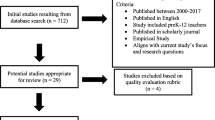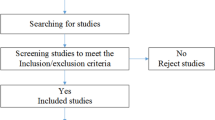Abstract
South Africa and Indonesia are currently implementing revised school curricula, which are informed by various socio-scientific, political, and economic imperatives related to global educational reform. Teacher preparedness to implement these curriculum reforms could be affected by their teaching philosophies and preferred curriculum ideologies. The present research sought to determine curriculum ideologies preferred by Indonesian and South African teachers, as a preliminary investigation into teachers’ beliefs about the role of education in different teaching and learning contexts. The research question underlying this non-experimental comparative quantitative research asked: How do South African and Indonesian teachers’ preferred curriculum ideology for school science compare? Data were collected using a previously validated questionnaire from purposively selected science teachers from the two countries. Results indicate that the majority of teachers in both countries generally prefer the student-centered curriculum ideology for school science. Differences were observed between teachers concerning specific aspects of school science. It is concluded that teachers have specific preferred ideologies for school science; however, there are local context-specific factors that inform the preferred ideologies among teachers. Further research is required to determine the impact of the preferred ideologies on teaching and learning and curriculum implementation.

Similar content being viewed by others
References
Alanazi, S. (2016). Comparison for curriculum ideologies. American Research Journal of Humanities and Social Sciences, 2, 1–110.
Alsubaie, M. A. (2016). Curriculum development: teacher involvement in curriculum development. Journal of Education and Practice, 7(9), 106–107.
Beatty, J. E., Leigh, J. S., & Dean, K. L. (2009). Philosophy rediscovered: exploring the connections between teaching philosophies, educational philosophies, and philosophy. Journal of Management Education, 33(1), 99–114.
Browne, M. (2018). Development of one’s teaching philosophy: the three “R’s” of relationships, relevancy, and rigor. Empowering Research for Educators, 2, 1), 1–1), 7.
Bustin, R. (2018). What’s your view? Curriculum ideologies and their impact in the geography classroom. Teaching Geography, 43(2), 61–63.
Caukin, N. G., & Brinthaupt, T. M. (2017). Using a teaching philosophy statement as a professional development tool for teacher candidates. International Journal for the Scholarship of Teaching and Learning, 11(2), 11.
Chung-Parsons, R., & Bailey, J. M. (2019). The hierarchical (not fluid) nature of preservice secondary science teachers’ perceptions of their science teacher identity. Teaching and Teacher Education, 78, 39–48.
Cotti, R., & Schiro, M. (2004). Connecting teacher beliefs to the use of children’s literature in the teaching of mathematics. Journal of Mathematics Teacher Education, 7(4), 329–356.
Creswell, J. W. (2014). Research design: qualitative, quantitative, and mixed methods approaches (4th ed.). California: Sage publications.
Darling-Hammond, L., & McLaughlin, M. W. (1995). Policies that support professional development in an era of reform. Phi Delta Kappan, 76(8), 597–604.
Darling-Hammond, L., Hyler, M. E., & Gardner, M. (2017). Effective teacher professional development. Palo Alto: Learning Policy Institute.
Department of Basic Education. (2011). Life sciences curriculum and assessment policy statement grade 10–12. Retrieved from www.thutong.doe.gov.za.
Department of Basic Education. (2018). Education statistics in South Africa 2016. Pretoria: Department of Basic Education Retrieved from https://www.education.gov.za/Portals/0/Documents/Publications/Education%20Statistic%20SA%202016.pdf?ver=2018-11-01-095102-947. Accessed 26 Jan 2019.
Farahani, M. F., & Maleki, M. (2014). A survey on tendency toward curriculum ideologies among academic board members in educational sciences faculties–Tehran 2010–11. Procedia-Social and Behavioral Sciences, 116, 2392–2396.
Faryadi, Q. (2015). Teaching philosophy statements. Online Submission, 5(6), 61–66.
Gunawan, I. (2017). Indonesian curriculum 2013: instructional management, obstacles faced by teachers in implementation, and the way forward. Advances in Social Science, Education and Humanities Research, 128, 56–63.
Hodson, D. (2004). Going beyond STS: towards a curriculum for socio-political action. The Science Education Review, 3(1), 1–6.
Kaplan, A., & Flum, H. (2012). Identity formation in educational settings: a critical focus for education in the 21st century. Contemporary Educational Psychology, 37(3), 171–175.
Lee, J. C. K., & Yin, H. B. (2005). Teacher receptivity to and concerns about curriculum change: an exploration of research on curriculum implementation. Journal of Educational Research and Development, 1(1), 107–128.
Lee, J. C. K., Yin, H. B., Zhang, Z. H., & Jin, Y. L. (2011). Teacher empowerment and receptivity in curriculum reform in China. Chinese Education & Society, 44(4), 64–81. https://doi.org/10.2753/CED1061-1932440404.
Lim, J., & Meer, J. (2017). The impact of teacher-student gender matches random assignment evidence from South Korea. Journal of Human Resources, 52(4), 979–997.
Little, J. W. (1993). Teachers’ professional development in a climate of educational reform. Educational Evaluation and Policy Analysis, 15(2), 129–151.
Mäkinen, M. (2018). Curriculum ideologies reflecting pre-service teachers’ stances toward inclusive education. Contemporary Pedagogies in Teacher Education and Development. https://doi.org/10.5772/intechopen.76326.
Mnguni, L. (2013). The curriculum ideology of the south African secondary school biology. South African Journal of Education, 33(2), 1–11.
Mnguni, L. (2018). The curriculum ideology recommended by novice teachers for life sciences in South Africa. EURASIA Journal of Mathematics, Science and Technology Education, 14(7), 3099–3108.
Nuangchalerm, P., & El Islami, R. A. Z. (2018a). Context of science on environmental conservation: comparative study between Thai and Indonesian novice science teacher students. Jurnal Penelitian dan Pembelajaran IPA, 4(1), 60–67.
Nuangchalerm, P., & El Islami, R. A. Z. (2018b). Comparative study between Indonesian and Thai novice science teacher students in content of science. Journal for the Education of Gifted Young Scientists, 6(2), 23–29.
Ornstein, A.C., & Hunkins, F. P. (2004). Curriculum: Foundations, Principles, and Issues. 4thed. New York: Pearson
Posner, G. J. (2003). Analyzing the curriculum (3rd ed.). New York: McGraw-Hill.
Putra, K. A. (2014). The implication of curriculum renewal on ELT in Indonesia. Parole, 4(1), 63–75.
Saka, Y., Southerland, S. A., Kittleson, J., & Hunter, T. (2013). Understanding the induction of a science teacher: the interaction of identity and context. Research in Science Education, 43(3), 1221–1244.
Sayed, Y. (2004). The case of teacher education in post-apartheid South Africa: politics and priorities. In L. Chisholm (Ed.), Changing class: education and social change in post-apartheid South Africa (pp. 247–265). Cape Town: HSRC Press.
Schiro, M. S. (2008). Curriculum theory: conflicting visions and enduring concerns. Los Angeles: Sage Publications.
Schiro, M. S. (2013). Curriculum theory: conflicting visions and enduring concerns (2nd ed.). Los Angeles: Sage Publications.
Schwab, K. (2016). The global competitiveness report 2016–2017. Geneva: World Economic Forum Retrieved from http://www3.weforum.org/docs/GCR2017-2018/05FullReport/TheGlobalCompetitivenessReport2017–2018.pdf. Accessed 26 Jan 2019.
Stearns, E., Bottía, M. C., Davalos, E., Mickelson, R. A., Moller, S., & Valentino, L. (2016). Demographic characteristics of high school math and science teachers and girls’ success in STEM. Social Problems, 63(1), 87–110.
Tidemand, S., & Nielsen, J. A. (2017). The role of socioscientific issues in biology teaching: from the perspective of teachers. International Journal of Science Education, 39(1), 44–61.
UN Development Programme. (n.d.). Goal 4: quality education. Retrieved from http://www.undp.org/content/undp/en/home/sustainable-development-goals/goal-4-quality-education.html. Accessed 26 Jan 2019.
Welch, W. W., & Lawrenz, F. (1982). Characteristics of male and female science teachers. Journal of Research in Science Teaching, 19(7), 587–594.
Wenger, E. (1998). Communities of practice: Learning, meaning, and identity. Cambridge: Cambridge University Press.
Acknowledgments
The researchers would like to thank all the teachers who participated in the research.
Author information
Authors and Affiliations
Corresponding author
Ethics declarations
Conflict of interest
The authors declare that they have no conflict of interest.
Ethical approval
The research was conducted in accordance with the ethical standards of the institution and with the 1964 Helsinki declaration and its later amendments or comparable ethical standards.
Additional information
Publisher’s note
Springer Nature remains neutral with regard to jurisdictional claims in published maps and institutional affiliations.
Rights and permissions
About this article
Cite this article
Mnguni, L., El Islami, R.A.Z., Hebe, H. et al. A comparison of the South African and Indonesian teachers preferred curriculum ideology for school science. Curric Perspect 40, 3–13 (2020). https://doi.org/10.1007/s41297-019-00089-x
Received:
Revised:
Accepted:
Published:
Issue Date:
DOI: https://doi.org/10.1007/s41297-019-00089-x




